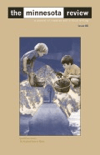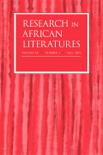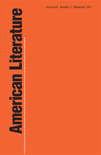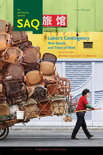
MINNESOTA REVIEW
Scope & Guideline
Defining the Future of Literary Critique
Introduction
Aims and Scopes
- Interdisciplinary Literary Criticism:
The journal fosters critical engagement with texts from various genres, blending literary analysis with cultural studies, theory, and personal narrative. - Cultural and Social Commentary:
It addresses contemporary cultural issues, reflecting on societal dynamics, identity, and the role of art in shaping discourse. - Creative Expressions and Forms:
The Minnesota Review embraces creative writing, including poetry and essays, as valid forms of scholarly communication, often blurring the lines between academic and artistic expression. - Focus on Marginalized Voices:
The journal highlights works that challenge dominant narratives, particularly those from marginalized communities, and explores themes of race, gender, and class. - Critical Engagement with Theory:
It promotes theoretical discussions that interrogate traditional literary frameworks, inviting contributions that push the boundaries of established thought.
Trending and Emerging
- Intersectionality in Literature:
There is a growing emphasis on intersectionality, particularly how various identities intersect and influence literary production and interpretation. - Environmental Literature and Eco-Criticism:
Recent works have increasingly addressed ecological themes, reflecting a heightened awareness of environmental issues and their representation in literature. - Digital Humanities and New Media:
Emerging discussions around digital humanities, including the impact of technology on literary forms and scholarship, indicate a trend towards integrating digital methodologies. - Mental Health and Literature:
The exploration of mental health themes in literary works is on the rise, showcasing how literature serves as a medium for discussing psychological experiences and societal perceptions. - Contemporary Performance and Oral Traditions:
There is a notable increase in works that engage with performance studies and oral traditions, reflecting a broader understanding of narrative beyond the written word.
Declining or Waning
- Traditional Literary Canon:
There is a noticeable decrease in articles centered around the traditional literary canon, as the journal shifts towards more contemporary and diverse voices. - Historical Literary Analysis:
Fewer papers are dedicated to historical literary analysis, suggesting a waning interest in strictly historical contexts in favor of more immediate cultural relevance. - Conventional Poetic Forms:
The prevalence of studies focusing on conventional poetic forms has declined, possibly due to the journal's embrace of experimental and hybrid genres. - Formalism:
The focus on formalist approaches to literature seems to be decreasing, as the journal increasingly prioritizes thematic and contextual interpretations. - Global Literary Studies:
Although still a relevant area, there appears to be a reduced emphasis on global literary studies in favor of localized or culturally specific narratives.
Similar Journals

Jeunesse-Young People Texts Cultures
Exploring the Voices of Youth Through Text and CultureJeunesse-Young People Texts Cultures, published by University of Toronto Press, is a pioneering academic journal dedicated to exploring the multifaceted experiences and representations of youth culture through literature and media. With an ISSN of 1920-2601 and an E-ISSN of 1920-261X, this quarterly journal (from 2018 to 2024) fulfills a vital role in the fields of Cultural Studies and Literature and Literary Theory, currently positioned in Q4 and Q3 quartiles respectively, reflecting its growing impact within the academic community. The journal serves as a platform for scholars, researchers, and students interested in understanding how texts and cultures shape the identities and experiences of young people. Though not officially designated as open access, its compelling articles provide critical insights and foster ongoing discussions among professionals in the humanities and social sciences. Situated in Canada, Jeunesse embodies a commitment to advancing knowledge and promoting dialogue on issues relevant to youth, making it an essential resource in this dynamic field.

RESEARCH IN AFRICAN LITERATURES
Transforming Perspectives on African LiteratureRESEARCH IN AFRICAN LITERATURES is a prestigious peer-reviewed journal published by Indiana University Press, dedicated to the critical exploration of African literary traditions, cultures, and texts. With an ISSN of 0034-5210 and an E-ISSN of 1527-2044, this journal stands out in the field of literature and literary theory, currently ranking in the 80th percentile of its category according to Scopus, making it a significant platform for scholars and researchers alike. Since its establishment, the journal has evolved through converged volumes from 2002 to 2024, consistently fostering innovative discourse and interdisciplinary approaches that illuminate the complexities of African narratives. Although it does not offer open access, the journal is integral for anyone engaged in African studies, providing critical insights that are essential for understanding the broader implications of literature within diverse cultural contexts. The journal's commitment to high standards of scholarship is reflected in its Q3 quartile ranking and its influential contribution to contemporary literary dialogue.

DALHOUSIE REVIEW
Fostering Innovative Dialogues in Literature and PhilosophyThe Dalhousie Review, a venerable publication based at Dalhousie University Press Ltd, is a cornerstone of Canadian literary and philosophical discourse. Established in 1973, this journal has continually provided a platform for critical thought and scholarship across multiple domains, including literature, literary theory, philosophy, and sociology. Although it currently holds a Q4 category ranking across its relevant fields, the journal is dedicated to fostering innovative dialogues and advancing research in these areas. Based in Halifax, Nova Scotia, Dalhousie Review welcomes contributions that explore the intersections of culture, society, and thought, making it an essential resource for researchers, professionals, and students alike. With its commitment to academic rigor, this journal invites the scholarly community to engage with its rich tradition of intellectual exploration, even as it navigates the contemporary landscape of literature and social sciences.

AMERICAN LITERATURE
Engaging with the Complexities of American NarrativesAMERICAN LITERATURE is a premier academic journal published by DUKE UNIVERSITY PRESS, dedicated to enhancing the understanding of literature produced in the United States from the colonial period to contemporary works. With its ISSN 0002-9831 and E-ISSN 1527-2117, this influential journal has maintained its status as a leader in the field, achieving a commendable Q1 ranking in Literature and Literary Theory for 2023, and holding a notable position (ranked #169 out of 1106) within its Scopus category. Since its inception in 1968, the journal has committed to publishing innovative research that explores diverse literary traditions, critical theories, and cultural contexts, making it an essential resource for researchers, scholars, and students alike. Although not available as an open-access publication, AMERICAN LITERATURE continues to play a critical role in shaping conversations around the complex narratives that define American literary heritage, inviting contributions that push the boundaries of literary studies.

SOUTH ATLANTIC QUARTERLY
Exploring the Depths of Cultural DiscourseSOUTH ATLANTIC QUARTERLY, published by DUKE UNIVERSITY PRESS, stands as a pivotal journal within the fields of Cultural Studies, Literature and Literary Theory, and Sociology and Political Science. With its rich historical foundation dating back to its inception in 1907, the journal has continuously provided a platform for rigorous scholarship and critical discourse. It has consistently achieved remarkable rankings, holding a distinguished place in the Q1 category across its relevant fields as of 2023, demonstrating its significant impact with Scopus rankings positioning it in the top percentiles. Though not an open-access journal, it offers a valuable repository of interdisciplinary insights that appeal to researchers, professionals, and students alike. The South Atlantic Quarterly remains essential for anyone looking to engage deeply with contemporary and historical issues spanning a broad spectrum of cultural and societal contexts, particularly through its insightful articles and critical reviews published biannually. Explore the multifaceted dimensions of the humanities and social sciences with this renowned journal, renowned for its commitment to intellectual rigor and innovative scholarship.

CANADIAN LITERATURE
Connecting Scholars to the Heart of Canadian LiteratureCanadian Literature is a distinguished journal published by the University of British Columbia, dedicated to exploring the rich landscape of Canadian literary studies. With its strong impact in the field, evidenced by its Scopus ranking of #197 out of 845 in the category of Arts and Humanities, specifically in Literature and Literary Theory, this journal serves as a pivotal platform for both emerging and established scholars. Covering a wide range of topics related to Canadian literature and culture, it aims to foster an interdisciplinary dialogue that reflects the diverse voices and narratives shaping the literary scene in Canada. Though the journal transitioned its coverage in Scopus after 2019, it continues to provide valuable insights and critical discourse in its publications. Researchers, students, and professionals looking to deepen their understanding of Canadian literature will find Canadian Literature an essential resource for contemporary scholarship.

Wenshan Review of Literature and Culture
Engaging Minds, Transforming Cultural UnderstandingWenshan Review of Literature and Culture, an esteemed journal published by NATIONAL CHENGCHI UNIVERSITY in Taiwan, serves as a vital platform for interdisciplinary scholarship in the realms of literature and cultural studies. With its ISSN 2077-1282 and E-ISSN 2077-1290, this journal aims to engage researchers, professionals, and students alike in critical discourse while significantly contributing to the academic community's understanding of contemporary literary and cultural phenomena. As of 2023, it holds a respectable position in Q4 for Cultural Studies and Q3 for Literature and Literary Theory, reflecting its growing influence within these disciplines. Although it operates under a non-open access model, the journal's commitment to quality research is evident in its rigorous peer-review process and dedication to publishing innovative ideas. By converging diverse perspectives from 2016 through 2024, the Wenshan Review not only fosters a deeper understanding of its subjects but also acts as a bridge connecting scholars from various backgrounds to share their insights more broadly and effectively.

INFINI
Enhancing Understanding Through Rigorous ScholarshipINFINI is a distinguished academic journal published by EDITIONS GALLIMARD, focused on the fields of Literature and Literary Theory. With a commitment to advancing scholarship, INFINI provides a platform for innovative research and critical discourse, contributing significantly to the literary discourse landscape since its inception. The journal, which has achieved a Q3 ranking in the 2023 category of Literature and Literary Theory, aims to foster a deeper understanding of literary texts, contexts, and theories through rigorous analysis and scholarly dialogue. Though it currently does not offer open access, INFINI remains an essential resource for researchers, professionals, and students dedicated to exploring the complexities of literature. By continuously publishing thought-provoking articles, INFINI plays a crucial role in shaping the future of literary studies. For more information or to submit your work, you can reach out to them at their address in Paris, France: 5 RUE SEBASTIEN-BOTTIN, 75328 PARIS, CEDEX 07, FRANCE.

NOUVELLE REVUE FRANCAISE
Fostering Dialogues in Literary CriticismNOUVELLE REVUE FRANCAISE, published by EDITIONS GALLIMARD, stands as a notable periodical in the realm of literature and literary theory, located in the heart of Paris, France. While it holds a Q4 quartile ranking in 2023 within its category, the journal's unique contribution to literary discourse spans two decades (2002 to 2022) and is characterized by a commitment to exploring contemporary literary criticism, theory, and interdisciplinary studies. Though it is not an open-access journal, it provides a platform for both established and emerging voices in literature, making it a valuable resource for researchers, literary professionals, and students alike. Engaging with NOUVELLE REVUE FRANCAISE means tapping into a rich tapestry of critical thought and cultural reflection that captivates the intellectual spirit of the times.

DAPHNIS-ZEITSCHRIFT FUR MITTLERE DEUTSCHE LITERATUR
Navigating the Landscape of Middle German ScholarshipDAPHNIS-ZEITSCHRIFT FUR MITTLERE DEUTSCHE LITERATUR, published by EDITIONS RODOPI BV, is a distinguished journal dedicated to the exploration and critical analysis of Middle German literature, offering scholars a dedicated platform to contribute to the field. With an ISSN of 0300-693X and an E-ISSN of 1879-6583, the journal has established itself as a vital resource for researchers and students alike, fostering academic discourse and advancing scholarship in literature and literary theory. Operating from the Netherlands, DAPHNIS holds a notable position in the academic community, currently categorized in the Q3 quartile of literature and literary theory, ranked in the 59th percentile among its peers on Scopus. The journal’s commitment to promoting critical insights and comprehensive studies makes it an essential reference point for anyone engaged in the literary academic landscape. While it is not currently open access, access options are available through institutional subscriptions, ensuring that valuable research is disseminated widely. For contributors and readers, DAPHNIS is not just an academic journal; it is a collaborative space where scholarship meets creativity, enriching the understanding of the rich tapestry of Middle German literature.